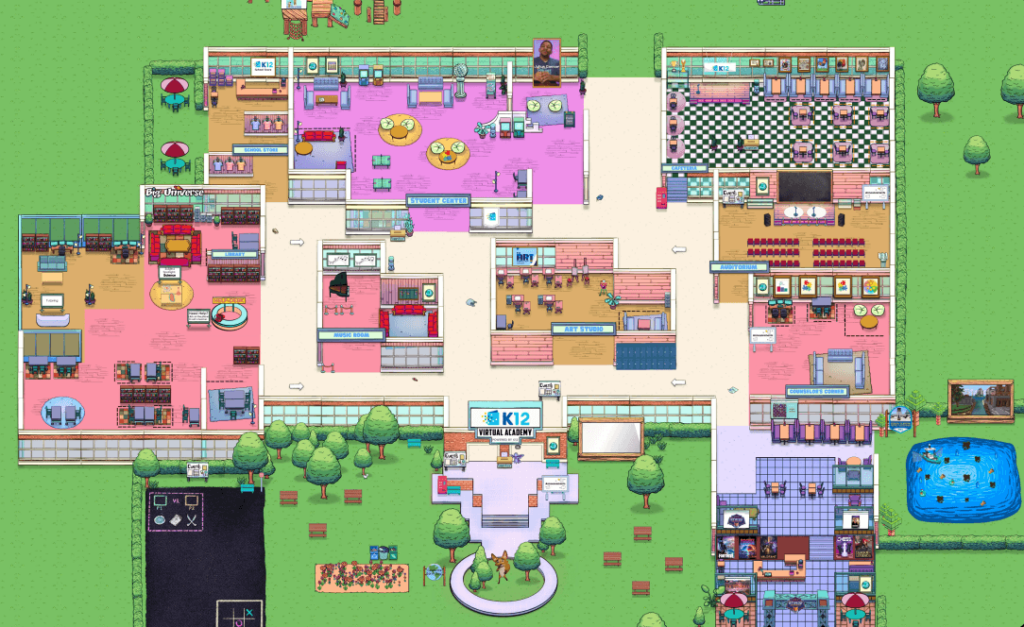
Originally published on Washington State Standard – November 20th, 2023
If you asked most families with young kids whether they’d do virtual schooling again after the shift to online classes during the pandemic, they’d likely say “never again.” But for Lia Carlile, it’s not a hypothetical — it’s a choice she’s made for her four kids.
Her youngest, 7-year-old Samuel Carlile, met his first-grade classmates in person for the first time at a class field trip to the zoo. His sister, 16-year-old Caroline Carlile, said he came home bursting with excitement about meeting the other students.
“He was like, ‘oh my gosh, I got to meet so and so, and we had such a great time,” Caroline said.
“It’s amazing to me the community that these teachers have been able to build with students that have never met face to face,” added Caroline, who goes to Insight School of Washington, an online school through Quillayute Valley School District. The district is headquartered in Forks, on the Olympic Peninsula, but the Carliles live in Curlew, a small community in eastern Washington near the Canadian border.
Lia Carlile spent years teaching at a brick-and-mortar school before switching to teaching math and science at Omak School District’s Washington Virtual Academies, which Sam and her other two kids attend. Now, she’s the assistant principal there. Carlile said virtual education is a “really good compromise” between homeschooling and public school.
“I get a job that I love and the kids go to a school they love,” Carlile said.
But amid a rise in online schooling in Washington and other parts of the country, some experts are skeptical that virtual learning matches the benefits of an in-person environment – especially for the state’s youngest learners. Data also suggest virtual schools aren’t preparing students for college or other education beyond high school.
Although standalone K-12 online schools have been around for years, they exploded in popularity after the rise in virtual learning during the pandemic. In recent years, districts have opened and expanded online program offerings, even as COVID receded.
As of 2022, there are 267 online schools in Washington state approved by the Office of Superintendent of Public Instruction. Although they are all authorized by public schools, some are run by for-profit companies; others are publicly run. Four schools offer virtual learning for preschoolers and 140 for elementary school students.
Virtual school administrators say parents often choose online learning for their young kids to allow the family more flexibility, to prevent bullying, or to remove barriers for kids with disabilities and mental health issues like anxiety or depression. Elementary school parents in particular are often more hands-on, administrators say, and choose online school because it allows them more control over their child’s education.
“For us, we travel. We have family all over. The flexibility of online school, it was a necessity,” Carlile said.
Here to stay
Before the pandemic, around 2,500 kindergarten to fifth grade students were enrolled in at least one online class each year. During the 2021-2022 school year, that number had more than tripled to 7,726, according to state reports, with just over 2,000 kindergarteners and first-graders enrolled in at least one online class. There are about a million K-12 students in Washington state.
Data isn’t yet available for how many kids stayed in online schools during the 2022-2023 school year. At two of the state’s largest online schools, Insight School of Washington and Washington Virtual Academies, enrollment has started returning to pre-pandemic levels, school administrators said.
But according to a report from the state Office of Superintendent of Public Instruction, the agency approved 48 new single-district online school programs and seven new multi-district online school programs in the 2021-2022 school year. At least 33 of those new programs serve elementary-aged students, according to Rhett Nelson, director of learning options at OSPI.
“Online learning continues to grow as an enrollment option across Washington,” the report said. “As schools adapt to the assorted needs of their students, online learning will continue to be an important element of public education.”
Insight School of Washington, one of the largest online schools, expanded to elementary and middle school levels during the pandemic. Administrators say they plan to keep it that way.
“Online education may have gotten a bit of a bad rap through the pandemic because so many districts were trying to rush into that process,” said Jillian Ralston, an academic counselor at Insight. “But what we have is something that’s been around for a long time.”
“We know how to support these students,” Ralston added.
‘Virtual recess’ and ‘camera-on’ policies
In the Carlile household, recess is on the computer.
“[With] virtual school, people say, ‘how do kids connect, and how do they make friends?’” Lia Carlile said. “So we have this program this year called the K-12 Zone, and it’s virtual recess.”
The K-12 Zone launched at Washington Virtual Academies and Insight School of Washington this year. Kids who use the K-12 Zone can move between online “rooms.” There are games in the zone and the whole space is moderated by an adult, similar to an in-person school’s recess monitor. Carlile said it’s largely used by middle school and older elementary students.
Every child enrolled at the two schools must also have a “learning coach,” an adult — usually a parent or grandparent — who supervises the child. The coach is much more involved with the younger grades, said Myron Hammond, executive director of Insight School of Washington.
Hammond said K-12 online school is much more interactive than an average online college class. At Insight, for example, the school has a “camera-on” policy for all students and encourages teachers to use web-based tools that allow students to work together.
Still, some online schools will offer occasional in-person events, like the zoo trip Sam went on, in acknowledgment of the benefits of in-person interaction.
“The only thing I miss in person that I can’t do virtually is give the kid a high-five,” Carlile said. “Pretty much everything else we can replicate.”
‘Just missing out so much’
Carlile believes “any student can be successful in a virtual environment,” as long as they have the right support.
However, experts are skeptical. Joy Egbert, a professor of education at Washington State University who studies technology use, said that while it depends on the student, in general, the younger a student is, the less likely they are to learn effectively in virtual school.
“I think some people think the online environment gives children access to everything they need and it doesn’t,” Egbert said.
There’s a higher learning curve for younger students. For example, Carlile’s son, Sam, had to learn how to use a computer before switching to online school. Egbert said that can be a challenge some young kids can’t overcome.
Caroline Carlile said she doesn’t know if online school would have worked for her when she was young, especially because she has attention-deficit/hyperactivity disorder. Still, she’s confident it’s working for her younger siblings.
“Because of Samuel’s teachers, he loves it,” Caroline said.
University of Washington professor Soojin Oh Park, who focuses on early education and child development, said she thinks young students cannot learn conflict resolution and other important skills in an online setting.
“By being solely reliant on virtual learning or [an] online schooling platform…they’re just missing out so much,” Park said.
Park said that if a child has consistent, in-person interactions outside of virtual school with kids their age and supportive adults, such as social groups for homeschooled kids, then “maybe it will be okay” for them learning online. That said, as a parent of a first grader, she’d approach any virtual learning environment with caution.
“I can’t imagine myself enrolling my own child in a fully online, virtual environment,” Park said.
Outcome gaps
At many of the largest virtual schools in Washington, most students are well behind state standards, particularly in math. And at Insight School of Washington, one of the largest for-profit online schools, only 7.6% of students met math standards in spring 2023, compared to 39% of all Washington public school students.
Hammond said the numbers reflect that many students come to Insight for credit recovery, and said Insight measures success based on parent feedback and increasing graduation rates.
“When I’ve met with families at graduations or even when I’ve made phone calls with families, it’s not uncommon for them to say ‘thank you,’” Hammond said. He added that families also frequently say they feel like they have more one-on-one support from their teachers in an online virtual program compared to at brick-and-mortar schools.
In a state audit report, districts reported they kept offering online school after pandemic restrictions ended because the programs were popular enough to become self-sustaining, even as districts lost access to temporary funding.
Walla Walla’s district officials said some students “thrived” in an online environment and Northshore School District, which covers an area around Bothell, said students who moved online “continue to do well compared to previous school years.”
But Park, the UW professor, pointed to a recent study that found brain activity decreases when interacting on virtual meeting platforms like Zoom, as opposed to in-person interactions.
Park said virtual learning can offer easier access to resources like bilingual teachers, but she’s also worried about the ways it might increase disparities. Wealthier parents, Park pointed out, will likely have more access to extracurricular activities and other services that help enrich a child’s educational experience beyond a virtual classroom.
Egbert, at WSU, said that a common misconception is that virtual school offers more freedom than in-person school. In reality, Egbert said, it is often more difficult for teachers to adapt a standardized curriculum to fit a particular child online than it is in person.
If a parent is dedicated to putting their child in online school, Egbert said they need to make sure the particular program they choose fits with the way their child likes to learn. Overall, kids who are more oriented to learning through listening may do better in a virtual program than those who are especially social or like to learn through physical activity.
“My advice for parents is: It’s not just what you want,” Egbert said. “If you want your children to learn, think about how that can happen best for them. Not just because you need to take them out of school often.”
To learn more about Washington Virtual Academies, visit https://wava.k12.com/.
To learn more about Insight School of Washington, visit https://insightwa.k12.com/.




